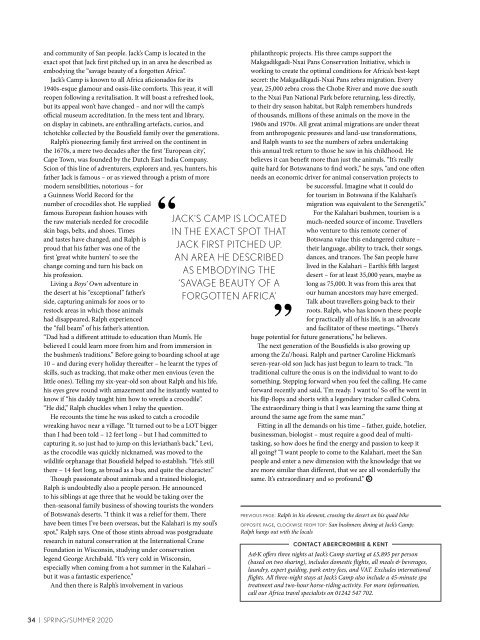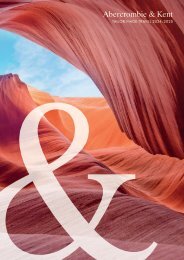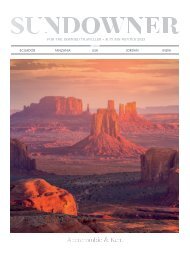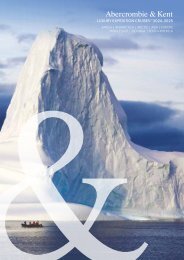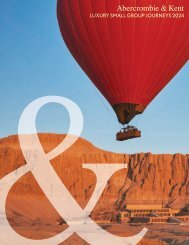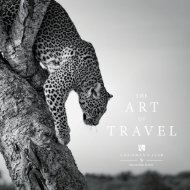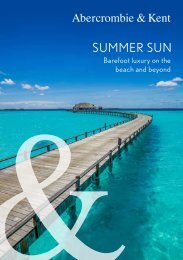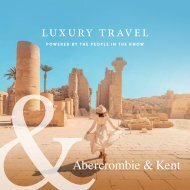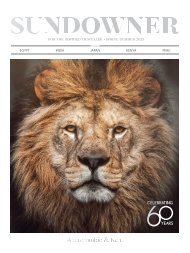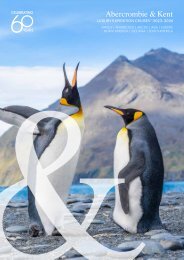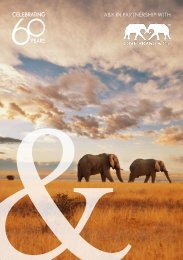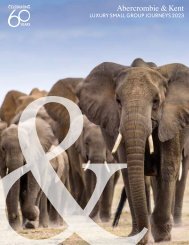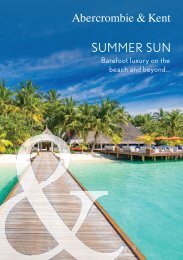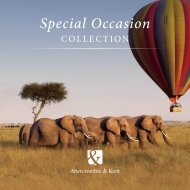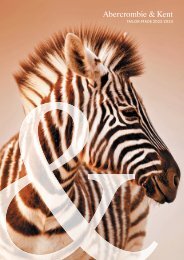Sundowner Magazine: Spring/Summer 2020
Create successful ePaper yourself
Turn your PDF publications into a flip-book with our unique Google optimized e-Paper software.
and community of San people. Jack’s Camp is located in the<br />
exact spot that Jack first pitched up, in an area he described as<br />
embodying the “savage beauty of a forgotten Africa”.<br />
Jack’s Camp is known to all Africa aficionados for its<br />
1940s-esque glamour and oasis-like comforts. This year, it will<br />
reopen following a revitalisation. It will boast a refreshed look,<br />
but its appeal won’t have changed – and nor will the camp’s<br />
official museum accreditation. In the mess tent and library,<br />
on display in cabinets, are enthralling artefacts, curios, and<br />
tchotchke collected by the Bousfield family over the generations.<br />
Ralph’s pioneering family first arrived on the continent in<br />
the 1670s, a mere two decades after the first ‘European city’,<br />
Cape Town, was founded by the Dutch East India Company.<br />
Scion of this line of adventurers, explorers and, yes, hunters, his<br />
father Jack is famous – or as viewed through a prism of more<br />
modern sensibilities, notorious – for<br />
a Guinness World Record for the<br />
number of crocodiles shot. He supplied<br />
famous European fashion houses with<br />
the raw materials needed for crocodile<br />
skin bags, belts, and shoes. Times<br />
and tastes have changed, and Ralph is<br />
proud that his father was one of the<br />
first ‘great white hunters’ to see the<br />
change coming and turn his back on<br />
his profession.<br />
Living a Boys’ Own adventure in<br />
the desert at his “exceptional” father’s<br />
side, capturing animals for zoos or to<br />
restock areas in which those animals<br />
had disappeared, Ralph experienced<br />
the “full beam” of his father’s attention.<br />
“Dad had a different attitude to education than Mum’s. He<br />
believed I could learn more from him and from immersion in<br />
the bushmen’s traditions.” Before going to boarding school at age<br />
10 – and during every holiday thereafter – he learnt the types of<br />
skills, such as tracking, that make other men envious (even the<br />
little ones). Telling my six-year-old son about Ralph and his life,<br />
his eyes grew round with amazement and he instantly wanted to<br />
know if “his daddy taught him how to wrestle a crocodile”.<br />
“He did,” Ralph chuckles when I relay the question.<br />
He recounts the time he was asked to catch a crocodile<br />
wreaking havoc near a village. “It turned out to be a LOT bigger<br />
than I had been told – 12 feet long – but I had committed to<br />
capturing it, so just had to jump on this leviathan’s back.” Levi,<br />
as the crocodile was quickly nicknamed, was moved to the<br />
wildlife orphanage that Bousfield helped to establish. “He’s still<br />
there – 14 feet long, as broad as a bus, and quite the character.”<br />
Though passionate about animals and a trained biologist,<br />
Ralph is undoubtedly also a people person. He announced<br />
to his siblings at age three that he would be taking over the<br />
then-seasonal family business of showing tourists the wonders<br />
of Botswana’s deserts. “I think it was a relief for them. There<br />
have been times I’ve been overseas, but the Kalahari is my soul’s<br />
spot,” Ralph says. One of those stints abroad was postgraduate<br />
research in natural conservation at the International Crane<br />
Foundation in Wisconsin, studying under conservation<br />
legend George Archibald. “It’s very cold in Wisconsin,<br />
especially when coming from a hot summer in the Kalahari –<br />
but it was a fantastic experience.”<br />
And then there is Ralph’s involvement in various<br />
JACK’S CAMP IS LOCATED<br />
IN THE EXACT SPOT THAT<br />
JACK FIRST PITCHED UP.<br />
AN AREA HE DESCRIBED<br />
AS EMBODYING THE<br />
‘SAVAGE BEAUTY OF A<br />
FORGOTTEN AFRICA’<br />
philanthropic projects. His three camps support the<br />
Makgadikgadi-Nxai Pans Conservation Initiative, which is<br />
working to create the optimal conditions for Africa’s best-kept<br />
secret: the Makgadikgadi-Nxai Pans zebra migration. Every<br />
year, 25,000 zebra cross the Chobe River and move due south<br />
to the Nxai Pan National Park before returning, less directly,<br />
to their dry season habitat, but Ralph remembers hundreds<br />
of thousands, millions of these animals on the move in the<br />
1960s and 1970s. All great animal migrations are under threat<br />
from anthropogenic pressures and land-use transformations,<br />
and Ralph wants to see the numbers of zebra undertaking<br />
this annual trek return to those he saw in his childhood. He<br />
believes it can benefit more than just the animals. “It’s really<br />
quite hard for Botswanans to find work,” he says, “and one often<br />
needs an economic driver for animal conservation projects to<br />
be successful. Imagine what it could do<br />
for tourism in Botswana if the Kalahari’s<br />
migration was equivalent to the Serengeti’s.”<br />
For the Kalahari bushmen, tourism is a<br />
much-needed source of income. Travellers<br />
who venture to this remote corner of<br />
Botswana value this endangered culture –<br />
their language, ability to track, their songs,<br />
dances, and trances. The San people have<br />
lived in the Kalahari – Earth’s fifth largest<br />
desert – for at least 35,000 years, maybe as<br />
long as 75,000. It was from this area that<br />
our human ancestors may have emerged.<br />
Talk about travellers going back to their<br />
roots. Ralph, who has known these people<br />
for practically all of his life, is an advocate<br />
and facilitator of these meetings. “There’s<br />
huge potential for future generations,” he believes.<br />
The next generation of the Bousfields is also growing up<br />
among the Zu’/hoasi. Ralph and partner Caroline Hickman’s<br />
seven-year-old son Jack has just begun to learn to track. “In<br />
traditional culture the onus is on the individual to want to do<br />
something. Stepping forward when you feel the calling. He came<br />
forward recently and said, ‘I’m ready. I want to.’ So off he went in<br />
his flip-flops and shorts with a legendary tracker called Cobra.<br />
The extraordinary thing is that I was learning the same thing at<br />
around the same age from the same man.”<br />
Fitting in all the demands on his time – father, guide, hotelier,<br />
businessman, biologist – must require a good deal of multitasking,<br />
so how does he find the energy and passion to keep it<br />
all going? “I want people to come to the Kalahari, meet the San<br />
people and enter a new dimension with the knowledge that we<br />
are more similar than different, that we are all wonderfully the<br />
same. It’s extraordinary and so profound.”<br />
previous page: Ralph in his element, crossing the desert on his quad bike<br />
opposite page, clockwise from top: San bushmen; dining at Jack’s Camp;<br />
Ralph hangs out with the locals<br />
CONTACT ABERCROMBIE & KENT<br />
A&K offers three nights at Jack’s Camp starting at £5,895 per person<br />
(based on two sharing), includes domestic flights, all meals & beverages,<br />
laundry, expert guiding, park entry fees, and VAT. Excludes international<br />
flights. All three-night stays at Jack’s Camp also include a 45-minute spa<br />
treatment and two-hour horse-riding activity. For more information,<br />
call our Africa travel specialists on 01242 547 702.<br />
34 | SPRING/SUMMER <strong>2020</strong>


